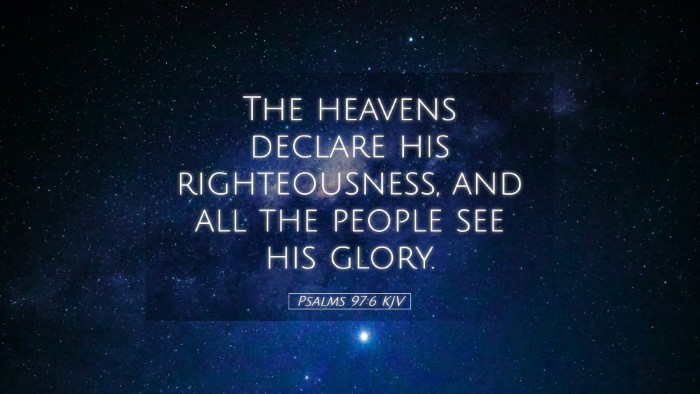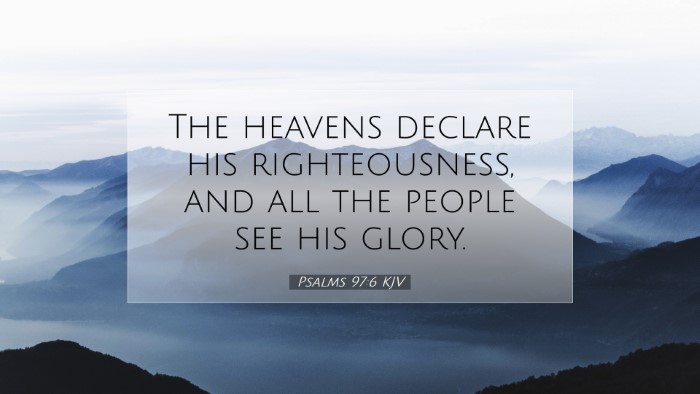Commentary on Psalms 97:6
Psalms 97:6: "The heavens declare his righteousness, and all the people see his glory."
Introduction
This verse from Psalms is a powerful declaration of divine majesty, emphasizing the manifestation of God's righteousness through creation. The call to reflect upon the visible world invites readers to recognize God's glory and sovereignty.
Divine Righteousness Revealed
Matthew Henry points out that the "heavens" symbolize both the celestial bodies and the broader realm of creation. They proclaim God's righteousness not only through their existence but also through the order and beauty inherent within them. The natural world serves as a continuous reminder of God's moral excellence and justice.
Albert Barnes expands on this idea by emphasizing that the declaration of righteousness is universal. All of creation, from the heavens to the earth, bears witness to God's just nature. The heavens do not simply declare God's existence; they proclaim His righteous character, and this proclamation is understood by all of humanity.
Adam Clarke notes that this declaration could also refer to God's judgments and how they manifest in the world. Every act of divine justice serves as evidence of God's righteousness, and the heavens themselves can be seen as witnesses to these acts. Clarke suggests that the visibility of God's glory is intended to elicit a response of reverence and acknowledgment from all people.
Understanding 'Glory'
The term "glory" encompasses a wide range of meanings, including splendor, majesty, and power. Matthew Henry argues that the glory of God seen in creation is a manifestation of His greatness. This glory is not hidden; it is apparent to all who are willing to observe and contemplate the natural order around them.
Albert Barnes reiterates that this glory extends beyond mere aesthetic beauty. It includes the elements of divine governance and providence that are visible in the world. Everything that occurs in the heavens and on the earth can be understood as part of God's glory—part of His eternal plans that echo His righteous nature.
Adam Clarke emphasizes that the "glory" here is not just the splendor of physical creation but also the moral and ethical dimensions of God’s work. The glory of God is tied to His righteousness; therefore, to observe the glory is to understand the righteous character that underpins all creation and governance.
The Implications for Humanity
The concluding statement of the verse—"and all the people see his glory"—indicates a universal recognition of God's righteousness. This has profound implications for worship and moral responsibility among humanity.
Matthew Henry suggests that this recognition should lead to a response of worship and reverence. All people, regardless of their circumstances, are called to see and acknowledge God's righteousness as revealed in the heavens. This recognition is not passive; it demands a conscious response of honor and awe.
Albert Barnes views this collective recognition as a clarion call to live in accordance with God's ways. If all people see His glory, they should be motivated to emulate that righteousness in their own lives. The acknowledgment of God’s sovereignty brings with it the responsibility to act justly and live righteously.
Adam Clarke further stresses the need for acknowledgment of God's glory as it relates to accountability. The visibility of His righteousness serves to remind humanity of their own ethical obligations. Ignoring such a clear declaration can lead to moral decay and disobedience.
Creation as a Witness
In this verse, creation itself acts as a witness to the nature of God. Matthew Henry points out that the heavens, seen in their grandeur, serve as an invitation to recognize the Divine. The beauty and complexity of the cosmos invite reflection and contemplation, ultimately leading back to God’s character.
Albert Barnes offers a perspective on how creation serves as a testament to God's attributes. As believers observe the heavens proclaiming His glory, they should be reminded that nature is continually testifying to God's righteous rule and existence. This reality fosters gratitude and devotion among the faithful.
Adam Clarke emphasizes the consistency and certainty of this divine declaration. Creation does not falter in proclaiming God's righteousness. Instead, it serves as an unchanging evangelist, calling people to witness God's glory and righteousness in every moment.
Conclusion
Psalms 97:6 encapsulates the essence of divine revelation through creation. The verse invites believers to acknowledge and declare the righteousness of God as it shines through the heavens. The insights of public domain commentators such as Matthew Henry, Albert Barnes, and Adam Clarke reveal that this acknowledgment should lead to worship, ethical responsibility, and an appreciation of God's providential governance over creation.
In a world often clouded by moral ambiguity, this psalm serves as a reminder of the ultimate authority and truth inherent in God's character. It calls for a response—a recognition that leads to both personal and communal declarations of faith, shaping how we relate to the divine and to one another.


